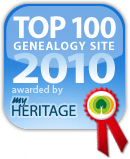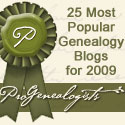Kimberly Powell described genealogy as “North America’s Fastest Growing Hobby.” While that is probably true, I personally consider genealogy to be more than just a hobby . When considered as an academic discipline, genealogy is generally classified with the humanities (studies of the human condition) . Academic studies in the humanities often rely on observation, analysis, and speculation to achieve their goals and, indeed, genealogy appears to fall into that category.
Still, from time to time there arises the question of whether some aspects of genealogy could also be considered to be a scientific discipline, where research relies on empirical evidence such as that derived from experimentation . If so, when would a genealogist devise an experiment to solve a genealogical problem, and how would the genealogist construct the experiment?
I don’t think that genealogy qualifies to be called a scientific discipline . There are, however, aspects of genealogical research that seem to be amenable to experimentation and The Scientific Method.
As a PhD scientist with many years of experience conducting bench-level experimentation, I use The Scientific Method in my daily work (and here I have capitalized The Scientific Method to make clear the fact that I’m referring to the set of steps commonly known by that name and not just a methodology that is scientific in nature) . The Scientific Method is most easily understood in the context of the pure sciences where one conducts laboratory experiments to test hypotheses . However, there is nothing in The Scientific Method that precludes its use in other disciplines.
The Scientific Method has been outlined and described in many different ways . One of those that I find particularly useful reads as follows:
- Define the question
- Gather information and resources (observe)
- Form hypothesis
- Perform experiment and collect data
- Analyze data
- Interpret data and draw conclusions (that may serve as a starting point for new hypothesis)
- Publish results
- Retest (frequently done by others)
When, by step 6, the researcher determines that the conclusions are unable to answer the question defined in step 1, the method loops back to step 2 to gather more information and resources or to step 3 with a new hypothesis.
So when should a genealogist apply The Scientific Method to a genealogical research problem and how does one go about doing so?
Part 2 of this series will begin a look at an example from my own research that I think demonstrates the use of The Scientific Method very well.
For other posts in this series, please see:
- Applying the Scientific Method to Genealogical Research (Part 1)
- Applying the Scientific Method to Genealogical Research (Part 2)
- Applying the Scientific Method to Genealogical Research (Part 3)
- Applying the Scientific Method to Genealogical Research (Part 4)
- Applying the Scientific Method to Genealogical Research (Part 5)
- Applying the Scientific Method to Genealogical Research (Part 6)
- Applying the Scientific Method to Genealogical Research (Part 7)
- Applying the Scientific Method to Genealogical Research (Part 8)
Copyright © 2010 by Stephen J. Danko




I personally consider genealogy to be much more than a hobby as well. When I wrote this article in 2002, I was reporting on the popularity of the field as defined by others, not as I would define it 🙂 There will always be people who approach family history research as a hobby rather than an academic or scientific discipline, but I don’t have a problem with that if it means more people talking to their relatives, collecting DNA, and preserving family history that might otherwise be lost.